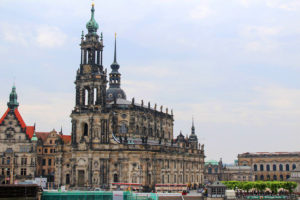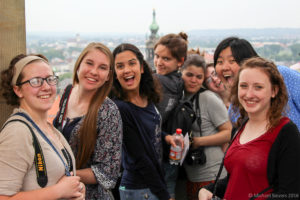After graduation, some Houghton students will head home to their families for the summer. Some will take the plunge into new jobs and internships. But some will travel abroad for a few weeks to seek a new kind of adventure.
This Mayterm, in a joint venture between the departments of political science and international development, Houghton will offer a Mayterm course in Sierra Leone. “The Mayterm is designed as a field research experience for students of international development,” said Oakerson. “Because I’m a political scientist, there is always a political element.” Being so specialized, the course’s enrollment is strictly limited and normally only extends to international development students. However, Oakerson shared that he is “always willing to talk with any interested student to see if their background and interests are appropriate to be considered for enrollment.” He has personally approved every participant. The course was offered every year between 2009 and 2012, shelved for several years due to the Ebola epidemic, then revived from 2016-2017.

“All of our work has been in the Northern Province, mostly in the vicinity of the City of Makeni, the provincial capital,” Oakerson continued. “We usually begin with a few days in Freetown, the capital of the country. Most of our work, however, takes place in rural villages, where we do intensive interviews with groups of village leaders. We choose research projects that we think will make a contribution to development. We have studied political decentralization, traditional agriculture, village governance, and customary land tenure.”
“Last year,” he recalled, “we did a comprehensive baseline development study of a traditional chiefdom—40 villages—located in one of the most remote sections of the country. In previous years we became involved in the design and implementation of a development project that connected village mango growers to a maker of juice concentrate for international export.”
“The research experience is essentially the same for everyone, except that students with
particular expertise and interest may be asked to work on some particular aspect of the course,” he continued. “For example, students minoring in public health may work on a healthcare aspect if relevant; students with a second major in environmental biology may work on a natural resource aspect.”
This May, Oakerson hopes to continue the past year’s work conducting feasibility studies for future development initiatives. “One [is] related to conservation and ecotourism possibilities,” he said, “and the other to the development of agricultural cooperatives able to process and market tree crops, including mangoes.”
Departing at roughly the same time, several art classes will immerse themselves in the most iconic settings of the Mediterranean: Rome, Venice, Florence, and Athens. On the trip, professors will lead two separate art history classes, a watercolor studio, and a photography seminar. Students will tour major historical sites like the Acropolis and Coliseum, cultural institutions like the Vatican Museum and Uffizi Gallery, and religious destinations like the Sistine Chapel and St. Mark’s Basilica.

“It’s going to be based in travel documentary,” said Ryann Cooley, Houghton professor of photography, who will lead students on a street photographer’s tour of the Mediterranean. “My goal is to take a documental, cultural view of the people, the culture, and the environment.”
Although each student can choose their own stylistic direction for the course, Cooley has planned a variety of “exercises and assignments that teach how to see and compose photographs.” One capstone project will encourage students to “work on developing a story” about the people they meet and places they visit.
Rather than guiding participants through the intricate technical aspects of camera operation, the walkabout studio course will focus on developing artistic sensibilities. “It’s learning how to take good pictures,” according to Cooley. “But there will be no smartphones,” he elaborated, “because I want people to understand how to control different aspects of the photograph.”
The course will also take advantage of the rich cultural and artistic pedigree of the region. “We’ll be spending a lot of time in museums,” Cooley said. “All the people on the Mayterm will go to every museum. Those taking the art history classes will answer questions and write papers. The studio classes will create work based on things that we see in the museums. Other projects will simply be inspired by the work, by having it in the back of your mind.”
Cooley has taught similar Mayterm photography courses across Europe and in New York City, and was immediately fascinated by the prospect of seeing classical Athenian architecture and Venetian canal system. “Each [location] has something very intriguing to me,” he said. “I think they’ll all bring a sense of street life, which will be fabulous for shooting.”
